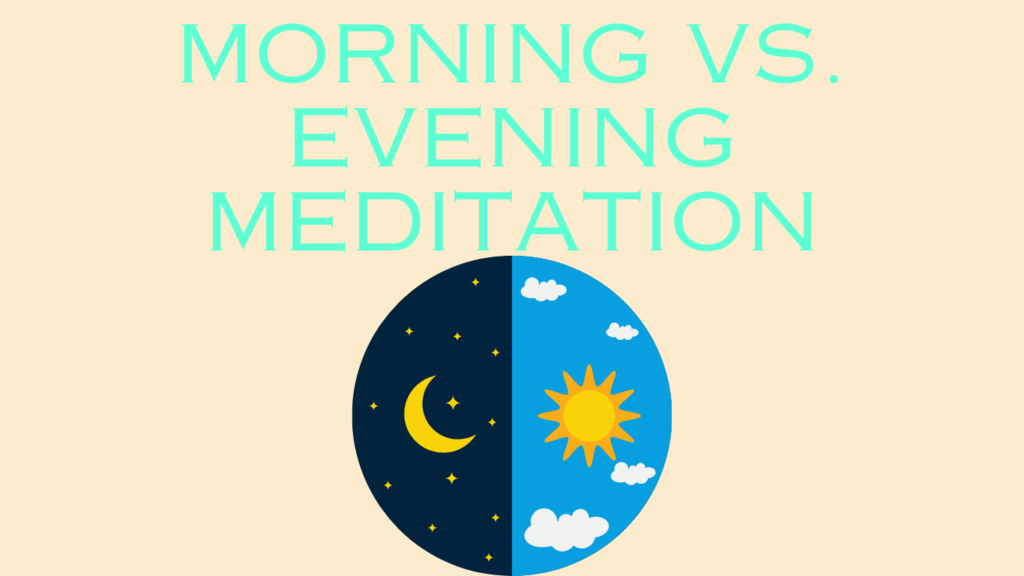Morning vs. Evening Meditation: What’s Best for You?

If you’re trying to build a meditation routine, one of the first questions that comes up is: When should I meditate—morning or evening?
The truth is, there’s no one-size-fits-all answer. Both times have unique benefits, and the “right” time depends on your goals, your schedule, and your energy patterns. Meditation can also be practiced at various times of the day, including the afternoon, to recharge and prepare for the rest of the day. Let’s break it down.
Table of Contents
Introduction to Meditation
Meditation is a powerful practice that can be incorporated into everyday life to improve mental health, reduce stress levels, and increase overall well-being. By setting aside a specific time for meditation, individuals can experience the numerous benefits it has to offer. Morning meditation, in particular, can be an excellent way to start the day, as it sets a positive tone and helps to clear anxious thoughts.
With regular practice, meditation can become a valuable habit that enhances one’s quality of life. To begin a meditation practice, it’s essential to find a quiet and comfortable space, either at home or in a peaceful outdoor setting, where one can sit and focus on their breath without distractions.
Why Meditate in the Morning?
Set the Tone for the DayMeditating in the morning helps you start the day with clarity and calm. It’s like hitting the reset button before your thoughts and to-do lists have begun to take over.
Your Mind Is (Relatively) QuietBefore emails, texts, or meetings, your brain is usually in a more receptive and quiet state. This makes it easier to drop into meditation without as much mental clutter. Morning meditation also helps keep the mind awake and enhances alertness and clarity.
Builds ConsistencyMorning meditation is easier to make a habit. It becomes a ritual, just like brushing your teeth—something you do before the day runs away with you. The benefit of making meditation a priority in the morning is that it sets a positive tone for the day.
Boosts Focus and EnergyEven a short session can increase focus, reduce reactivity, and help you move through your day with more intention and presence. Morning meditation can also help prepare for the day ahead.
Great For:
- People with busy, unpredictable days
- Anyone trying to reduce morning anxiety
- Building a solid daily habit
- Those who wake up early and want to enhance their productivity
Why Meditate in the Evening?
Helps You UnwindEvening meditation is a powerful way to process the day’s events and release accumulated stress. It’s like mentally putting down your baggage before bed. Additionally, it helps individuals relax and transition from a busy day to a more relaxed state.
Improves Sleep QualityMeditating before bed can help quiet a racing mind, slow down your nervous system, and prepare your body for restful sleep. Evening meditation can also help those who have trouble sleeping by calming an active mind.
More Emotional InsightAfter a full day of emotions and interactions, your evening sit can feel deeper—almost like a debrief with your inner self. Evening meditation can help individuals feel more relaxed and less stressed.
Encourages ReflectionEvening meditation often lends itself to gratitude practices, letting go exercises, or simply observing the emotional residue of the day. It also aids in the transition from the day’s activities to a state of rest.
Great For:
- People who struggle to fall asleep
- Anyone processing stress or overwhelm
- Using meditation as a daily emotional check-in
Mindfulness and the Present Moment
Mindfulness is a crucial aspect of meditation, as it allows individuals to focus on the present moment and let go of worries about the past or future. By being mindful, one can cultivate a sense of calm and relaxation, which can be beneficial in all aspects of life. Morning meditation sets the tone for the day, helping individuals to stay focused and aware, while evening meditation can aid in unwinding and preparing for a restful night’s sleep.
Guided meditation can be an excellent tool for those who are new to meditation, as it provides a gentle and supportive approach to mindfulness. Regular practice of mindfulness and meditation can lead to a greater sense of peace and well-being, making it easier to navigate the challenges of everyday life.
Night Meditation Techniques
For those who consider themselves a night person, night meditation can be a great way to unwind and prepare for bed. Sleep meditation, in particular, can help individuals fall asleep faster and improve sleep quality. To practice night meditation, find a quiet and comfortable space, either in bed or in a peaceful room, and focus on slow, deep breaths.
Guided meditation can also be helpful in this context, as it can provide a soothing and calming voice to lead the meditation session. By incorporating night meditation into one’s bedtime routine, individuals can experience a more restful and rejuvenating sleep, which can have a positive impact on their overall health and well-being.
Time to Meditate and Prioritization
When it comes to finding the best time to meditate, it’s essential to prioritize this practice and make it a non-negotiable part of one’s daily routine. For morning people, meditating first thing in the morning can be an excellent way to start the day, while for those who prefer the evening, meditating before bed can be a great way to unwind.
The key is to find a time that works best for one’s schedule and lifestyle, and to make meditation a regular habit. By doing so, individuals can experience the numerous benefits of meditation, including reduced stress levels, improved focus, and increased overall well-being. It’s also important to remember that meditation is a personal practice, and what works for one person may not work for another, so it’s crucial to experiment and find the best time and approach that suits one’s needs.
Factors Affecting the Best Time
Several factors can affect the best time to meditate, including one’s schedule, lifestyle, and personal preferences. For example, those with young children may find it challenging to meditate in the morning, while others may prefer to meditate during their lunch break or after dinner. Additionally, individuals who practice yoga or other mindfulness exercises may find that meditating at the same time each day helps to enhance their practice.
Ultimately, the best time to meditate is the time that works best for one’s individual circumstances, and it’s essential to be flexible and adapt to changes in one’s schedule or routine. By prioritizing meditation and making it a regular part of one’s daily routine, individuals can experience the numerous benefits it has to offer and improve their overall quality of life.
So… Which One’s Better?
Here’s the short answer: the best time to meditate is the time you’ll actually do it. Morning and evening both have real benefits, but it comes down to what fits naturally into your life. Finding the best time of day to meditate can enhance consistency in practice and maximize the benefits of meditation.
If you’re an early riser who likes a calm, focused start—try mornings. Meditation feels beneficial both mentally and physically when practiced at different times of the day. Establishing a regular meditation time can enhance the effectiveness of the practice.
If you’re a night owl who needs to decompress—go for evenings. Practicing meditation at various times during the day can improve relaxation, stress management, and overall sleep quality. If you want both? Even better. A morning sit to center yourself, and a brief evening check-in to let go.
Practicing meditations at different times of the day can enhance relaxation, improve focus, and help manage stress. Consistently practicing meditation effectively and correctly is crucial for long-term benefits.
Making meditation a priority in daily life helps integrate it into your routine, ultimately enhancing well-being. Meditation can also enhance productivity, particularly during the lunch break and in the morning. Establishing a regular meditation practice contributes to stress reduction and enhances clarity of thought.
A Final Tip: Don’t Overthink It
You don’t have to pick one forever. Try both. See how your body and mind respond. Meditation isn’t about perfection—it’s about practice. Whether you’re watching the sunrise or winding down after sunset, what matters most is simply showing up.
Finding specific times for meditation, such as first thing in the morning or last thing at night, can help integrate meditation into a busy lifestyle. Making meditation a priority in the morning can enhance daily mindfulness and productivity. It doesn’t matter when you choose to meditate; the important factor is to establish a routine.
Many individuals worry about their schedules and the possibility of not having enough time to practice. Creative solutions, like meditating during commutes or incorporating mindfulness throughout the day, can alleviate these worries and reinforce meditation as a priority in one’s life.

